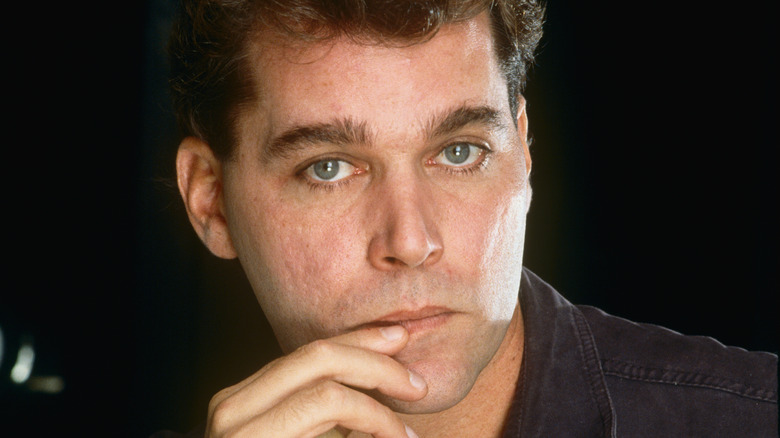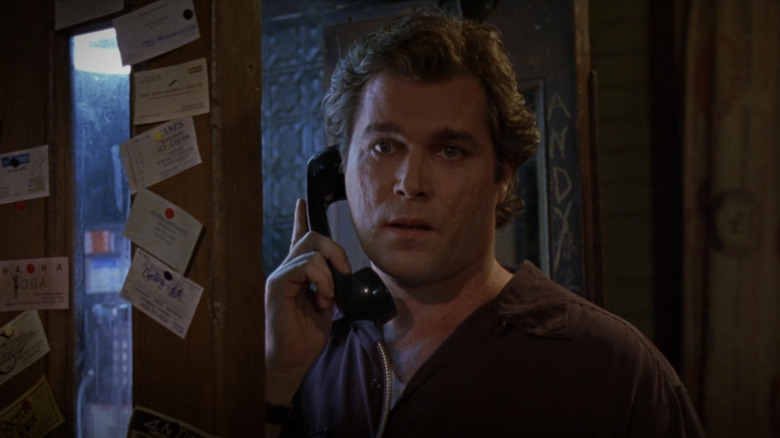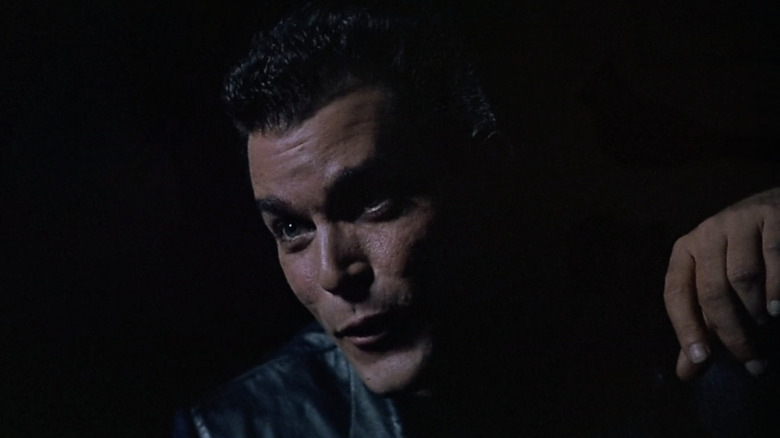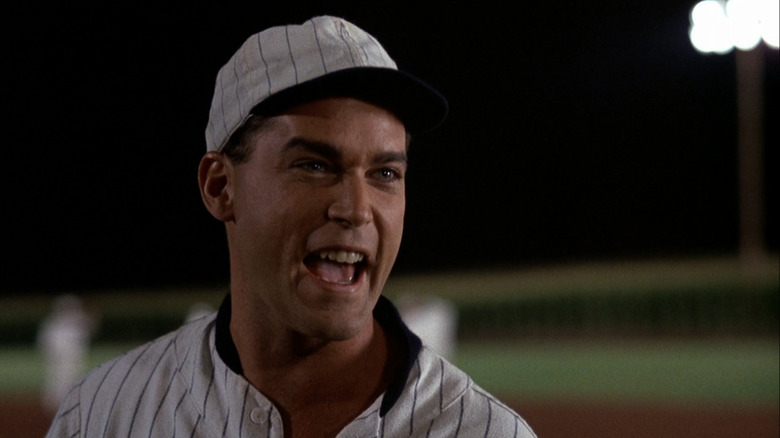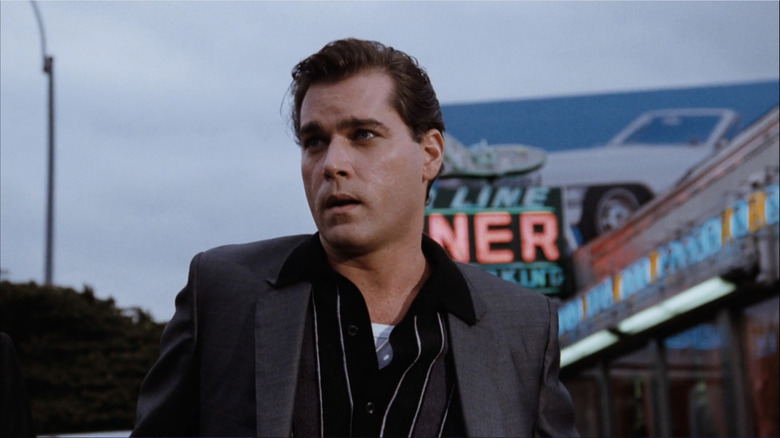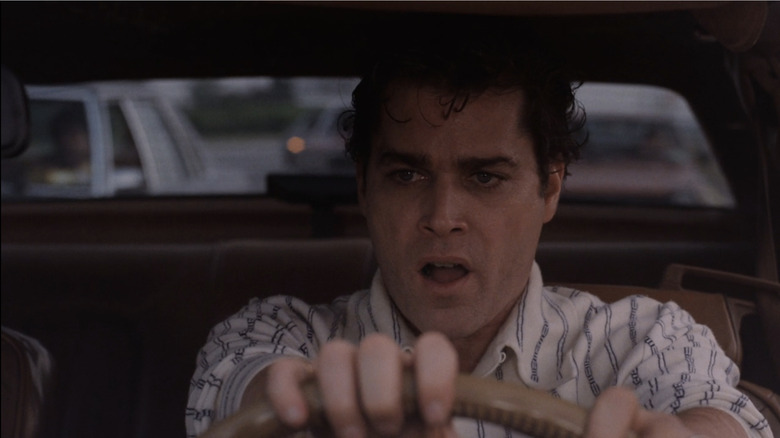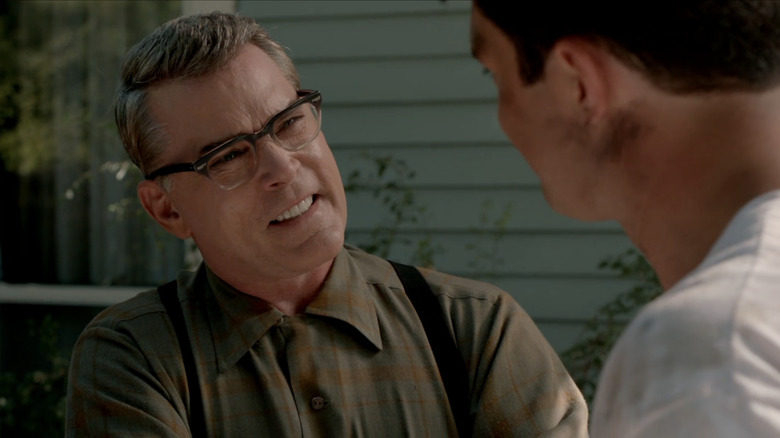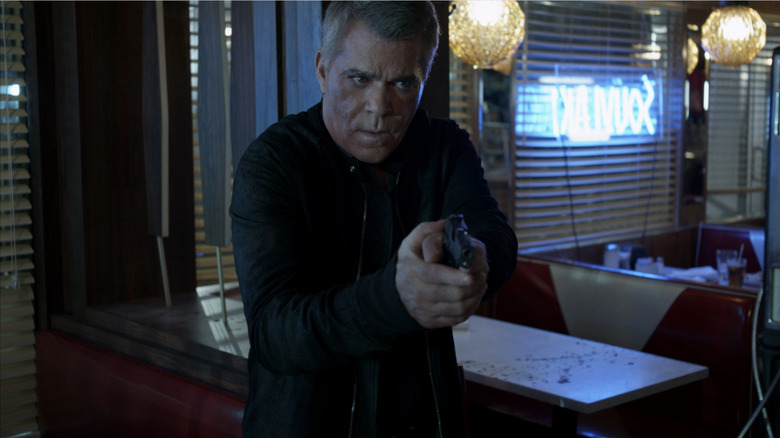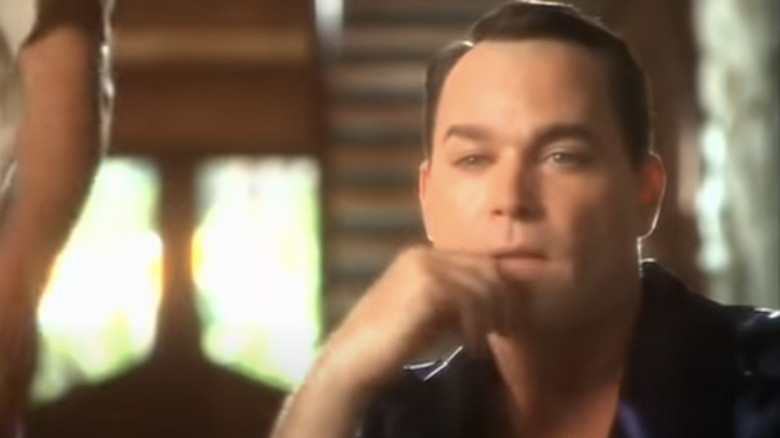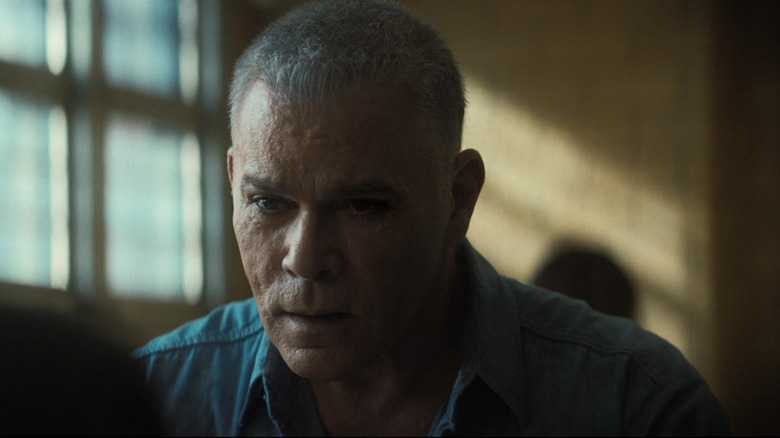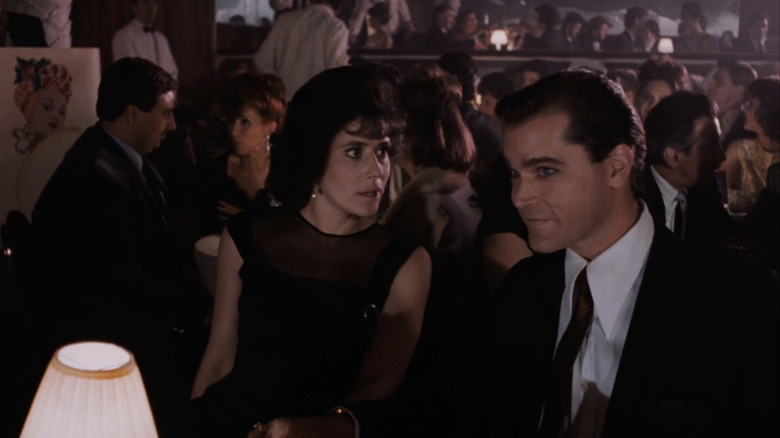The Untold Truth Of Ray Liotta
The entertainment world was shocked by the sudden death of actor Ray Liotta in May 2022. The 67-year-old New Jersey native was in the Dominican Republic filming a movie at the time of his death. Armed with piercing blue eyes and a slightly deranged laugh that brought an edge to even his gentlest roles, Liotta was a welcome presence on the big and small screens for nearly 40 years. He was a consummate professional, whether working with Joe Pesci or Miss Piggy; it's a testament to his work ethic that he had half a dozen projects in the works at the time of his death, including the Apple TV+ limited series "Black Bird," premiering in July 2022.
Though he made his mark in everything from horror to family films to tequila ads, Liotta's signature role was undoubtedly midcentury mobster Henry Hill in Martin Scorsese's 1990 masterpiece "Goodfellas." His performance was so complete, reflecting the history of the American mafia in from its 1960s heyday to its 1980s downfall, that it was easy for people to assume Liotta simply was Henry Hill. But he had more to offer, as an artist and a human being, than one lauded role. Here are some things you may not have known about the life and legacy of Ray Liotta.
Adopted at Birth
Liotta was born in 1954 in New Jersey and given up by his birth mother. After spending the first six months of his life in an orphanage, he was adopted and raised by Alfred and Mary Liotta. Alfred and Mary were of Italian and Scottish descent. Liotta knew that he was adopted from an early age, but nonetheless struggled with anger toward his biological parents. "At first, I didn't understand how a parent could give up a child," he told People in 2021. "So I had that kind of energy of being like, that's f***** up."
Many years later, his experience as a child of adoption would lead him to take a role in the 2014 Christian film "The Identical," a kind of alternate-history Elvis Presley biopic in which The King's twin brother (newcomer Blake Rayne in dual roles) did not die in childbirth as in real life, but was instead given up for adoption and raised by an Evangelical preacher (Liotta). Liotta didn't have much experience with the religious side of the role — he had been raised Catholic but his family were never regular churchgoers — but the adoption element to the story resonated strongly with him, particularly the fact that the adopted twin has not just a mega-famous brother but an entire family that he has never met before. This mirrored Liotta's own experience when he decided to track down his biological parents as an adult, which we'll get to later.
A Fateful Acting Class
After a few years plugging away on the long-running soap opera "Another World," Liotta moved west to Los Angeles in 1981 in the hopes of making it into films. The first few years were lean, with bit parts in things like the short-lived 1980s adaptation of "Casablanca" and an episode of "St. Elsewhere." During that time Liotta took an acting class led by Harry Mastrogeorge, whose students over the years include Bryan Cranston, Daryl Hannah, and Djimon Hounsou. Liotta's classmates were then-unknowns Kevin Costner, Steven Bauer, and Bauer's then-wife Melanie Griffith, who in 1986 was cast in the lead role alongside Jeff Daniels of Jonathan Demme's road comedy "Something Wild." Now 30 years old and with little of an acting career to show for it, he had to be talked into asking Griffith for help getting an audition. Griffith happily obliged and Liotta read for the part of her character's psychotic ex-husband. To his surprise, he was cast, and the rest is history.
Even after Liotta became established as a film actor and movie star, though, he remained in Mastrogeorge's class for more than a dozen years, returning in between film projects. It was a personal and professional friendship that continued through the rest of Liotta's life; in December 2021, Liotta posted a picture of the two of them at lunch to his Instagram account.
Fears of Typecasting
"Something Wild" was the very definition of a star-making turn, a tour de force of Liotta's unique livewire energy, and it earned him a Golden Globe nomination and notice from several critics' organizations. But that kind of right-out-the-gate attention has its downside as well, and Liotta was very aware of the threat of being typecast.
"I got a lot of bad-guy scripts after 'Something Wild,'" he told Rolling Stone in 2021. "I waited a year till I did my next movie because I was well aware that [getting typecast] could happen." Liotta followed up "Something Wild" with a pair of gentle performances in the family drama "Dominick and Eugene" and in the Kevin Costner baseball fantasy "Field of Dreams," where he played the ghost of Chicago "Black Sox" player Shoeless Joe Jackson. When speaking to Rolling Stone, though, Liotta looked back on that period of his career with some regret, feeling that a little typecasting wasn't always a bad thing. "I should have done it [those 'bad-guy' scripts] and capitalized on what was going on, because it could have been really successful. But at that time, I just had a different mentality."
Getting Goodfellas
"There's not a day that goes by that I don't hear somebody mention 'Goodfellas,'" Liotta told GQ magazine in 2010 in honor of the film's 20th anniversary. "It's defined who I am, in a sense." The road to "Goodfellas" started for Liotta at the Cannes Film Festival. Martin Scorsese was in attendance with his controversial religious film "The Last Temptation of Christ," which had already generated such outrage and threats of violence against the celebrated director that he was being protected by a team of bodyguards. Liotta knew that Scorsese's next film would be an adaptation of Nicholas Pileggi's true-crime book "Wiseguy." As such, Liotta wanted to introduce himself to Scorsese and discuss playing the central role and narrator, Henry Hill. "Ray approached me in the lobby and the bodyguards moved toward him," Scorsese told GQ in 2010, "and he had an interesting way of reacting, which was he held his ground, but made them understand he was no threat. I liked his behavior at that moment, and I saw, oh, he understands that kind of situation."
Liotta may have convinced Scorsese that he was perfect for the role, but producers Irwin Winkler and Barbara De Fina were initially looking for a bigger star to anchor the film; "Tom Cruise was discussed," remembered Winkler, and an LA Times article from 1990 mentions Alec Baldwin, Nicolas Cage, and Val Kilmer in contention as well. But a chance encounter between Liotta and Winkler at a Venice Beach restaurant changed the producer's mind. "We went outside ... and [Liotta] really sold me on the role right that evening. I called Marty the next morning and I said, 'I see what you mean.'"
Real Life Wiseguys
"Goodfellas" is not an epic of princes and kings like Francis Ford Coppola's "Godfather" trilogy. Henry and his compatriots Jimmy Conway (Robert De Niro) and Tommy DeVito (Joe Pesci) are workaday members of the Lucchese crime family, far removed from any of the top members of the organization other than mid-level capo Paulie Cicero (Paul Sorvino). It's a seedy, violent world, and to achieve the right level of realism Scorsese surrounded his actors with extras and bit players from the neighborhood, so to speak. The production held a sort of open casting call for real-life wiseguys at the famous New York Italian restaurant Rao's. "We were told I could consider some of them for the film," recalled casting director Ellen Lewis in GQ, "but others were a little too hot to be considered: 'That guy can't be in front of a camera.'"
One particular wiseguy who could not be in front of a camera was Henry Hill himself, the real-life inspiration for Liotta's role. Hill went into witness protection with his wife Karen (played in the film by Lorraine Bracco) after testifying against his former associates in the early 1980s. Author Nicholas Pileggi provided Liotta with audio tapes of interviews with Hill, but the actor never met his namesake until after the film was complete. Liotta got a call "out of the blue" from Hill, who asked to meet. "And the first thing [Hill] said was, 'Thanks for not making me look like a scumbag!'" Liotta told the New York Post in 2020. "And I said, 'Serious? Did you see the movie?'"
Found Family
After growing up with a chip on his shoulder over being adopted, not understanding his birth mother's reasoning, he decided to do something about it. Or rather, his wife Michelle Grace did after seeing a segment on "The Oprah Winfrey Show" featuring Troy Dunn, a "locator" who specializes in tracking down missing relatives and reuniting adopted children with their biological parents. In his 2010 book "It's Never Too Late," Dunn writes about his experience with Liotta's case, stating that Liotta's birth mother had him at age 16 and gave him up for adoption not because she didn't want him, but that she wanted him to grow up in a more stable home than she could provide.
When Liotta starred in "The Identical" in 2014 he told The Hollywood Reporter that he connected with the film's story not just as an adopted child, but as someone who discovered that he had long-lost siblings. "I found my birth mother and found out I have ... a half-brother, five half-sisters, and a full sister that I didn't know about until fifteen years ago." Speaking to the Christian Post about finally meeting his biological family, he said that his biggest takeaway was "Thank God I'm adopted."
Love and Marriage
Ray Liotta and Michelle Grace were married from 1997 to 2004 and have a daughter, Karsen, who was born in 1998. Prior to their marriage, Michelle was married to Chicago Cubs baseball player and MLB commentator Mark Grace from 1988 to 1993; in fact, she and Liotta met at a Cubs game while he was playing, though Liotta insisted that nothing extramarital happened between the two.
"She was married, and we didn't cheat," he told the Pottsgrove Mercury in 2003 while promoting the Joe Carnahan cop drama "Narc." "But after she and Mark split up, she was looking for an acting coach. She was asked to do a rap video, and she called me up one day and said, 'Should I do this video?' And I said, 'No, you should probably have dinner with me.'" Grace was his producing partner on "Narc" and appeared alongside him in the films "A Rumor of Angels" and "The Rat Pack."
Their daughter Karsen has also gone into the family business, appearing as the daughter of Liotta's character in the NBC mid-2010s Jennifer Lopez cop drama "Shades of Blue," and in the Adam Sandler horror comedy "Hubie Halloween."
A Message from the Sinatras
"The Rat Pack" was a 1998 biopic of entertainers Frank Sinatra, Dean Martin, Sammy Davis, Jr., Peter Lawford, and Joey Bishop. It was produced by HBO and covers the titular group's scandalous years as the kings of mobbed-up Las Vegas. Alongside Joe Mantegna as Martin and Don Cheadle as Davis, the actors were heavy on talent and charisma, even if none of them particularly looked or sounded like their real-life counterparts.
But it turns out that that wasn't the only Frank Sinatra film in development at the time, or even the only Frank Sinatra film with its sights on Liotta. In a 2021 episode of the CNBC series "Jay Leno's Garage" (via the New York Post), Liotta revealed that Sinatra's daughters Nancy and Tina had approached him about starring in a miniseries that they were producing. When Liotta turned their project down in favor of the HBO film, the Sinatras sent him a fake horse's head in the mail, a la "The Godfather." Though the gesture is a clear threat in the film, in real life the sisters clearly meant it in jest. "[They] said, 'Oh you could do this one, but you couldn't do the one we wanted you to?'" Liotta told Leno.
Rarely a Gangster
In that same episode of "Jay Leno's Garage," Leno makes the point that Liotta has an extensive cinematic resume — over 100 film, television, and even video game projects — and very few of those have him playing a mobster, so the idea that he was typecast by "Goodfellas" seems to be a misconception. "I've only ever played three mafia guys," Liotta says, before conceding that he's played a lot of otherwise bad guys. "But if you're gonna be typed with a movie, that's not a bad one to be typed with."
"Goodfellas" undoubtedly casts a shadow over nearly everything else in Liotta's filmography. The public memory of the film is in many ways more powerful than the film itself, and like finding out that Humphrey Bogart never said "Play it again, Sam," it can be surprising even for film buffs to realize just how few gangsters Liotta has played over his career. But that rarity creates value; it becomes a special occasion when he returns to the world of organized crime, whether it's Tommy Vercetti in "Grand Theft Auto: Vice City" or aging mafioso "Hollywood" Dick Moltisanti in the "Sopranos" spin-off film "The Many Saints of Newark" — a role that Rolling Stone's Alan Sepinwall described as "a glimpse of a world where Liotta might have played Joe Pesci's character in 'Goodfellas.'"
A Good Fella, Not a Wiseguy
By Liotta's own estimation, he played a lot of villains in his time, and probably should have played even more, especially during those breakout years between "Something Wild" and "Goodfellas." "These bad guys, they stick out to people," he said to Rolling Stone. Considering the length and breadth of his career, though, it is not surprising to learn that in real life Liotta was the opposite of a Hollywood tough guy. "I have never been in a fight at all," he told People in 2021, "except for during sports."
His gentle nature was seconded by the wave of tributes that poured forth from fans and colleagues in the days after his death. Lorraine Bracco, whose career was similarly shaped by the phenomenal success of "Goodfellas," tweeted a recent picture of she and Liotta together, writing "[Fans] always ask what was the best part of making that movie. My response has always been the same...Ray Liotta." His acting class friend of "Field of Dreams" star Kevin Costner tweeted a clip from the film in which Liotta as "Shoeless" Joe Jackson hits a curveball straight back at Costner's Ray Kinsella, a moment that was not originally in the script. "God gave us that stunt," Costner wrote, "Now God has Ray."
